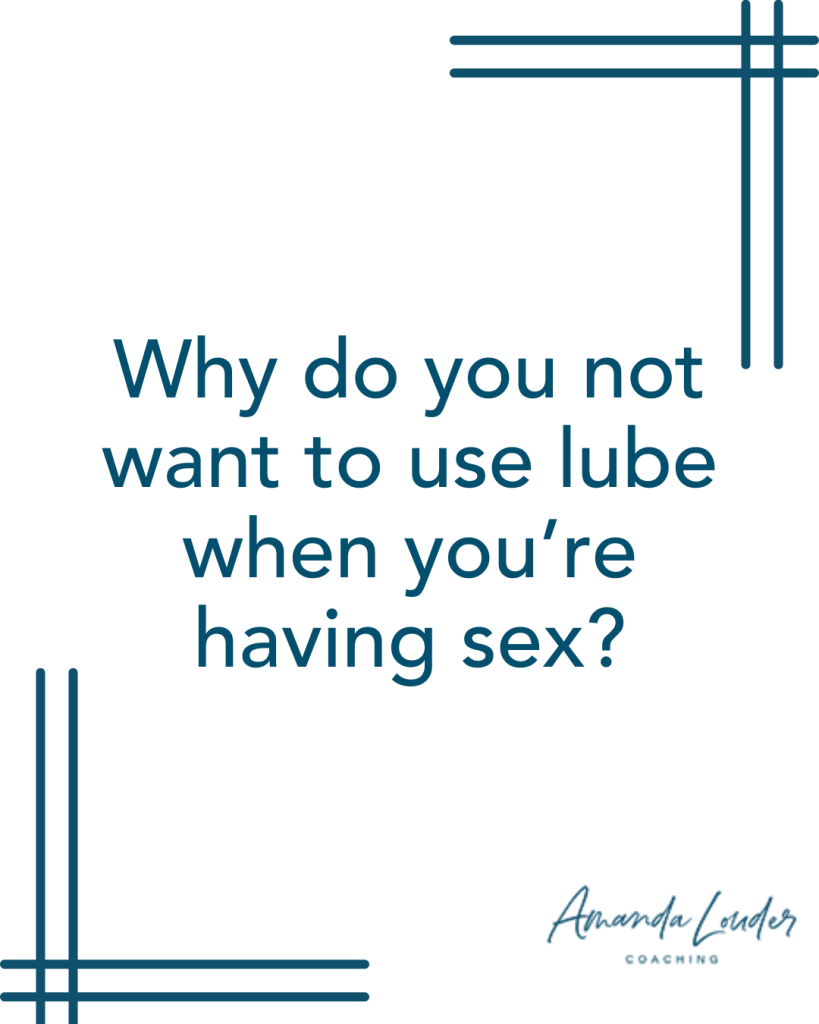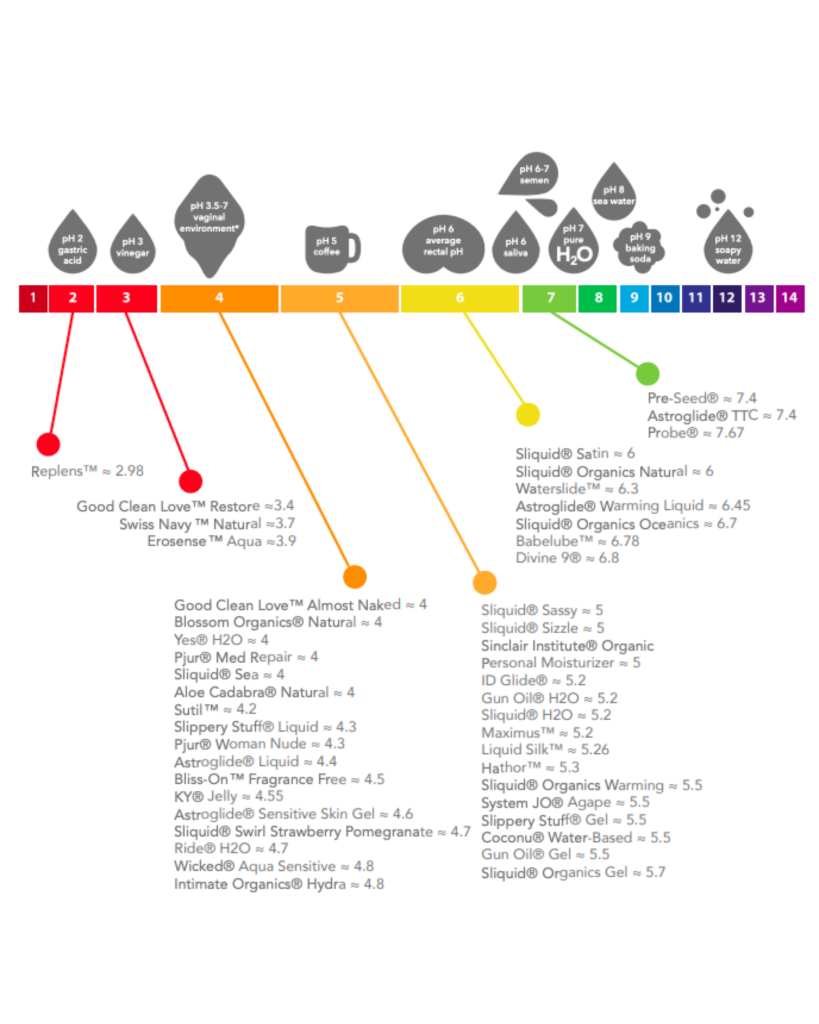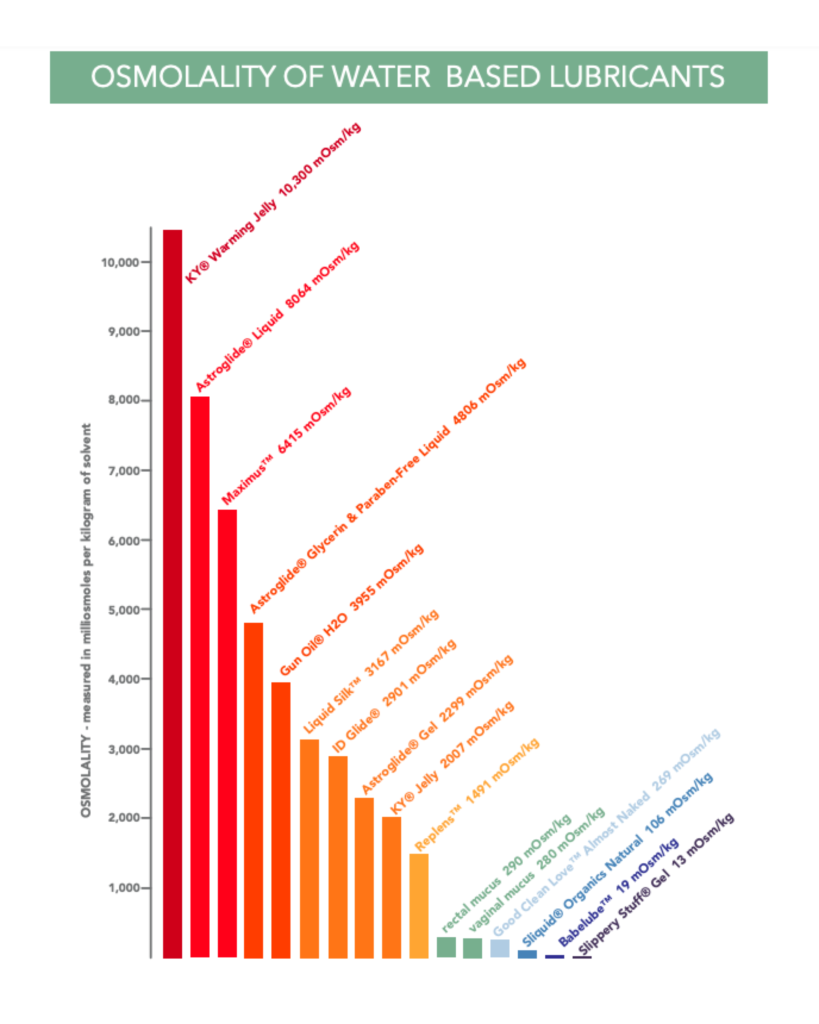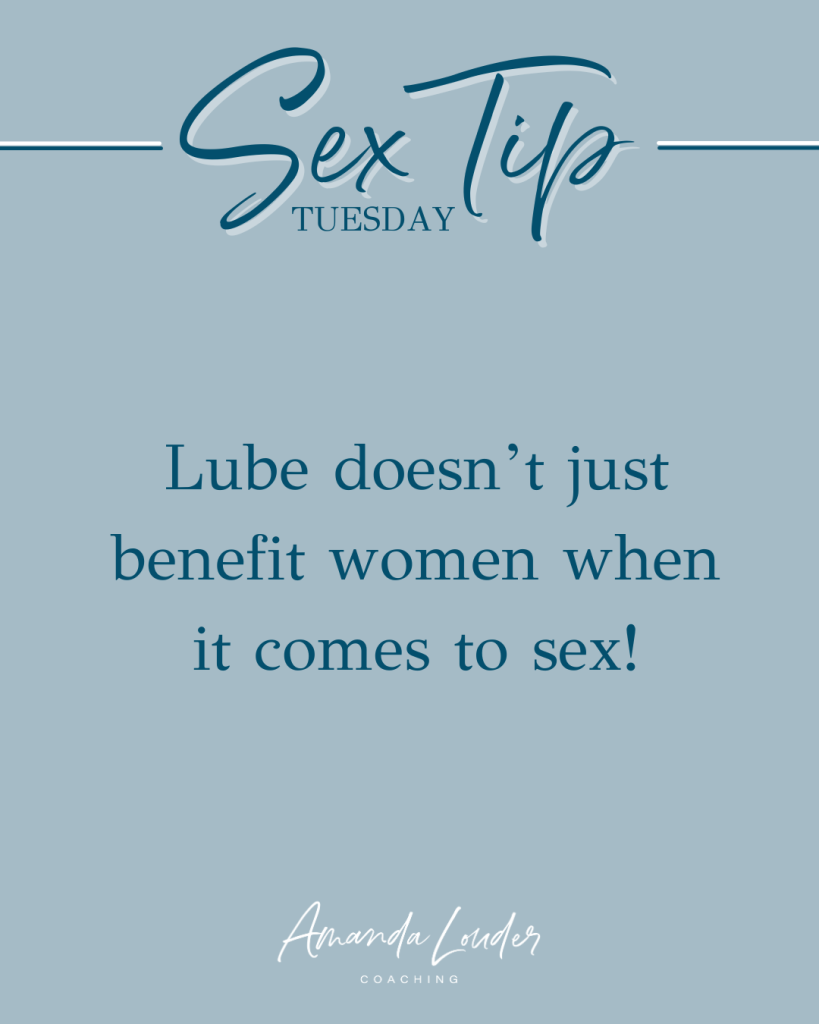
Clients will often tell me that they don’t need to use lube because there isn’t anything wrong with them. This could not be further from the truth! There are many things that will affect your natural lubrication, including stress or dehydration, so having some lube you love at your fingertips will only make sex better. In this episode, we’re going to talk about why we use lube, how to choose the right lube and what lubes I like the best. You should be using lube! Here’s why.

Show Notes:
Follow Amanda on Facebook and Instagram.
Join Amanda’s Private Facebook Group.
References for this episode:
Coconu carries my favorite water-based and oil-based lube. Their hemp infused oil-based is a favorite of mine and can enhance orgasms. Use the code Amanda at checkout for 15% off.
Uberlube is another favorite of mine. This one is silicone based. It has vitamin E, is so silky and soft, feels good on my skin, and is long lasting. It is also flavorless.
Sutil is recommended if you have had a decrease in estrogen levels, either with menopause or breastfeeding.
Other brands I’ve either tried or heard good things about: Sliquid, Aloe Cadabra, Waterslide, YES, and The Butters.
Show Summary:
It’s been nearly 200 episodes since I discussed Lube and so I decided it was time to revisit this important topic.
Natural Lubrication
The vagina is naturally moist, aided by fluid from the cervix and secretions from Bartholin’s glands. This lubrication is pivotal for sexual arousal in women, preparing the vagina for penetration and minimizing friction. Inadequate lubrication can lead to pain during intercourse.
There is a myth that additional lube is only needed when there is a problem. There are also incorrect assumptions that younger women do not need to use lubrication because they should be able to lubricate just fine on their own. Neither of these are true.
A woman’s ability to lubricate is affected by many factors including:
- Medications like contraceptives, anti-depressants, and allergy medications
- Changes in hormone levels due to time of the month, contraception, pregnancy, breastfeeding, menstruation, or after childbirth
- Menopause
- Dehydration
- Stress and anxiety
- Relationship issues
- Chemical products – washing powders, harsh soaps, feminine sprays, douches, or perfumed toilet paper.
- Lack of foreplay
Why Use Lube?
Coconu, one my favorite brands of lube recently had a post on Instagram stating three benefits of Lube. They said:
- Enhanced sensation – Lube isn’t just a sidekick; it’s a sensation amplifier! It turns up the volume on pleasure for both partners.
- Comfort is Queen: Comfort is the key to unlocking desire. Lube ensures a friction-free zone, reducing discomfort and creating a space for uninhibited enjoyment.
- Increased Pleasure: Lube isn’t just a bedroom essential; it’s your secret weapon for a smoother, more satisfying journey that makes reaching the big “O” easier for women.
And while we often talk about how lube benefits women, it benefits men as well, contributing to increased pleasure and prolonged intercourse.
One of the best reasons for using lube is to prevent damage or abrasion to the delicate tissues of the vagina, penis, and anus. The vagina and anus are lined with mucous membranes, much like the inside of the mouth and nose. This tissue is very sensitive and can tear easily. Without proper lubrication, the delicate tissues can get micro-tears that can cause pain, irritation, and be more susceptible to infection.
Choosing the Right Lube
So, now we know WHY we need lube, what lube should we use? When you were getting married you may have been informed by your friends to get some lube from the local pharmacy or grocery store before your wedding night. While the advice for lube is great – I want to caution you to not just use something from the grocery store because it is convenient. Many lubes (including the most well-known brands) are full of toxic chemicals that you really don’t want in your body. I know that it may sound crazy that these companies are creating things that are actually harmful for your body. I don’t think it’s done maliciously, it’s just more of an oversight. Lube is regulated as a medical device, not a topical, so companies can include ingredients that aren’t formulated for the delicate tissue and membranes in the genitals and keeping the genital microbiome healthy. Luckily, there are some great companies making lube that is safe and non-toxic, which I will share with you a bit later.
When selecting a lubricant, it’s crucial to understand the main types and why you would choose each kind. The four main types are water-based, oil-based, silicone-based, and hybrid lubes. You can find safe, non-toxic lubes for all four types.
- Water-Based Lube
You’ll have the most options with a water-based lube. It’s usually the most affordable and is compatible with safer sex barrier methods, like condoms and also works well with sex toys. It’s available in a wide variety of consistencies, from thick gels to thinner liquids. Water-based lube feels more like the body’s natural lubrication, but it tends to dry quicker than other types of lubes, so you may need to reapply more often.
Water-based lube generally has the longest list of ingredients and always contains preservatives, which makes it the most potentially irritating type of lube, especially for those with sensitive skin or compromised immune systems.
There are two major characteristics of water-based lubes that are good predictors of their safety. pH and osmolality.
What is pH?
pH is the measure of a solution’s acidity or basicity on a scale of 0-14. A pH of 0 would be most acidic, a pH of 14 would be most basic, and a pH of 7 would be neutral.
Vaginal pH
The pH of the vagina plays a role in maintaining a healthy bacteria and yeast and acts as a defense against pathogen transmission. The pH changes throughout the menstrual cycle and the woman’s life with the changes of estrogen and progesterone levels. It tends to be more acidic, rising closer to neutral with the decrease in estrogen. Lubricants that are more acidic, combined with low estrogen can cause burning or stinging in the vagina.
Anal pH
Anal pH is close to neutral and remains there throughout hormonal fluctuations and life. Many personal lubricants have pH levels around 4 or 5 (so more acidic), so they may cause stinging and irritation in the anus. Find a lubricant with a pH closer to 6-7 to avoid this when using it in the anal area. Silicone and plant oil-based lubricants don’t have pH values to worry about, and tend to be very popular for anal play rather than water-based.
PH LEVEL CHART

Osmolality
One of the biggest concerns with water based lube is osmolality. Do you remember studying osmosis in high school biology? Yeah, I didn’t really remember much about it either. But this is what it means.
Osmosis is a process in which molecules of a solvent tend to pass through a semipermeable membrane from a less concentrated solution into a more concentrated one, thus equalizing the concentrations on each side of the membrane.
So, with water-based lube you want to find one that has about the same osmolality as the mucous membranes in the body, otherwise it will either put too much water into the tissues or take water out of the tissues.
If there are lubes that put too much water into the cells, this can cause them to rupture. This one was a big eye-opener for me. Two of the top water-based lubes do this. And when I’m talking about cells, I’m also talking about sperm. These lubes can actually cause sperm to explode. Think about what that can mean for your fertility? You may be trying to have a baby and using one of these lubes and it’s making the sperm explode.
There are also lubes that take water out of the body and dehydrate it and can cause the entire wall of the vagina to slough off. And this isn’t something you can see with the naked eye. You aren’t going to be aware of this. But it’s probably going to cause problems like burning and irritation. You aren’t going to be as protected from infection. It’s really not good!
OSMOALITY CHART

- Oil-Based Lube:
Oil based lubes provide lots of moisture and are longer lasting than water-based. They are safe to use with all non-toxic sex toy materials. But, oil based lubes are NOT compatible with most safer sex barriers, so do not use oil based lubes with latex or polyisoprene condoms. You also don’t want to use any oil based lube that isn’t plant based inside the body. A lot of oil based lubes are petroleum based which you shouldn’t use inside the body because it can breed bacteria. A lot of people like coconut oil because it’s readily available. It can be great but dries fairly quickly. One thing to note with oil based lubes is that it usually takes longer to clear out of the body than other types of lubricants, so it is not recommended for people who experience chronic, recurring vaginosis, UTI’s, or yeast overgrowth.
- Silicone-Based Lube:
Silicone based lube is the best overall type that works for most people. Silicone lube is hypoallergenic as it doesn’t typically soak into the skin and doesn’t need preservatives. It lasts longer than any other type of lubricant and isn’t water-soluble, so it’s great for play in the shower or bath. It is compatible with all safer sex barrier methods and it is what is used on almost all pre-lubricated condoms. It is recommended to choose one that has 4-6 or less ingredients. Silicone based lube is not good to use with most silicone sex toys because it can change the texture of your toy. Although I’ve personally used it with my Lelo brand toys just fine because Lelo uses such a high quality silicone. But use at your own risk.
- Hybrid Lube (Silicone & Water):
This hybrid lube is less likely to cause irritation than water-based lube but isn’t regarded as hypoallergenic. It lasts longer than water-based but not as long as silicone based. It is compatible with sex toys and safer sex barrier methods. It is a newer product with less information available and less general availability outside of speciality stores.
Concerns and Added Ingredients
Be cautious about certain ingredients in lubes, as they can lead to issues such as yeast overgrowth, irritation, and compromised cell integrity. Ingredients to watch out for include glycerin(e), propylene glycol, nonoxynol 9, chlorhexidine gluconate, petroleum oils, polyquaternium-15, benzocaine, sugars, and menthol.
Many of these you might not recognizing, so make sure you are looking up the ingredients in your lube. Anything with a type of sugar should be avoided for women as they can cause yeast infections. Flavored lube works great for external use only but should be thoroughly washed off before penetration.
And you may have seen lubes that offer a “warming sensation.” This usually means they include menthol, which is like putting icy-hot on your genitals and is not recommended.
Final Thoughts
– Not all lubes work well for all purposes, so you’ll want to find lubes that work well for the purpose you want them for. And you might need different lubes for different types of activity.
– If you are wanting to do anal play, you’ll want something thicker. There are lubes specifically for this purpose.
– A sex shop is a great place to find lubes. They will have many that aren’t available at the grocery store and often have testers so you can test how they feel and their consistency. You can also purchase online.
– Your doctor is probably not educated on lube. They may recommend the big name brands just because that is what they know. KY is a lot like surgi-lube which is a sterile lubricant that is used in hospitals for a variety of things. It’s water-based and contains some of the ingredients I talked about before. It’s really good for things like inserting a catheter, but it really isn’t great for personal use. This is most likely the lube at your doctor’s office, so I suggest taking your own lube when you go in for your annual exams.
If you’re exploring new lubes, here are some brands to consider.
Coconu carries my favorite water-based and oil-based lube. Their hemp infused oil-based is a favorite of mine and can enhance orgasms. Use the code Amanda at checkout for 15% off.
Uberlube is another favorite of mine. This one is silicone based. It has vitamin E, is so silky and soft, feels good on my skin, and is long lasting. It is also flavorless.
Sutil is recommended if you have had a decrease in estrogen levels, either with menopause or breastfeeding.
Other brands I’ve either tried or heard good things about: Sliquid, Aloe Cadabra, Waterslide, YES, and The Butters.
Remember to find the one that works best for you. I hope this episode provides valuable insights, and you can find links to referenced lubes and sources on the episode’s webpage.




